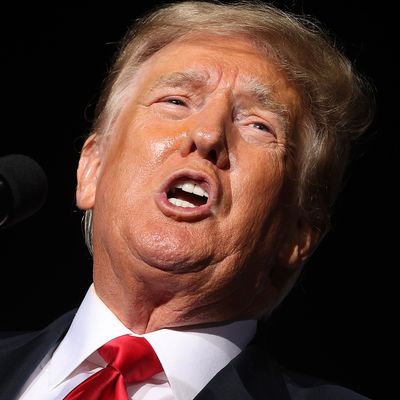
Former president Donald Trump isn’t too keen on the recent investigations into his alleged improprieties, whether they be the “witch hunt” of the inquiry into his campaign contacts with Russia, the “dirty work” of the Manhattan district attorney’s criminal inquiry into his businesses, the “hoax” of his first impeachment inquiry, or the “total hoax” of the second. It’s only natural that he would not be particularly fond of the latest effort to understand one of his more egregious actions: the House Select Committee to Investigate the January 6th Attack on the United States Capitol.
On Thursday, Politico and the Washington Post reported that Trump’s attorney had written to several former aides who were subpoenaed by the committee, telling them not to provide testimony or hand over documents. Lawmakers had requested that the group — which includes Steve Bannon, former White House chief of staff Mark Meadows, aide Dan Scavino, and Defense official Kash Patel — provide relevant communications by Thursday and sit for interviews next week. In the letter, Trump’s attorney argues that these exchanges are protected by executive “and other” privileges and that “President Trump is prepared to defend these fundamental privileges in court.”
It’s not yet clear whether Trump’s former aides provided records by the Thursday deadline, nor is it certain that Trump still has that executive privilege, as Politico explains:
Experts are divided over the question of how former presidents can wield executive privilege. David Rivkin, formerly a lawyer for the Ronald Reagan and George H. W. Bush administrations, told Politico that only sitting presidents can assert executive privilege.
Saikrishna Prakash, a professor at the University of Virginia School of Law, said this conflict enters legally uncharted territory and that the Supreme Court has found that former presidents do enjoy executive privilege, at least to some extent.
“Imagine you’re having a conversation with President Biden in the last two months of his presidency,” Prakash said. “Are you going to give him candid advice if you know it’s going to come out in two months, that the privilege is over in two months? No, you might not.”
If Trump’s advisers do not comply, representatives on the committee have said they might request that the Justice Department prosecute them. If convicted of criminal contempt of Congress, the advisers could face up to a year in prison and a fine of up to $100,000.
Although the Trump advisers’ cooperation remains an open question, on Thursday, the select committee also subpoenaed the organizers of the “Stop the Steal” rally. One of those responsible for planning it, Ali Alexander, claimed that he had worked with Republican representatives Andy Biggs, Mo Brooks, and Paul Gosar to pressure Republicans to vote against the election certification by changing “the hearts and the minds of Republicans in that body hearing our loud war from outside.”






























